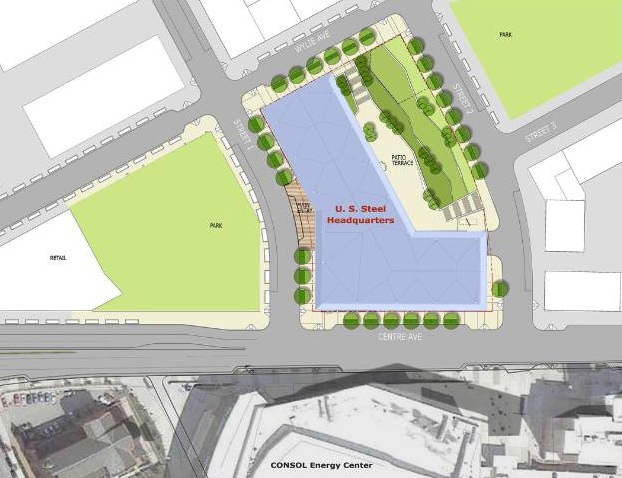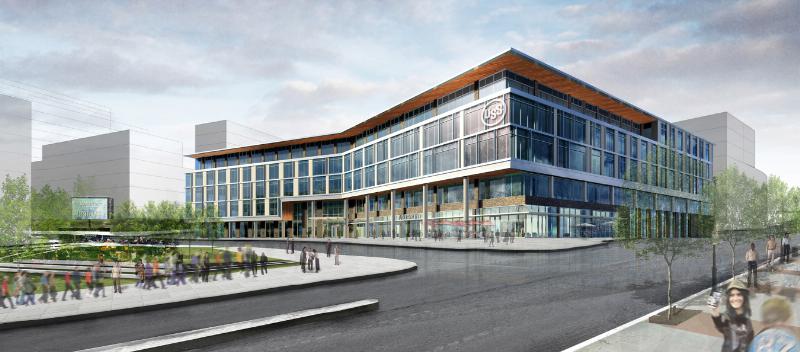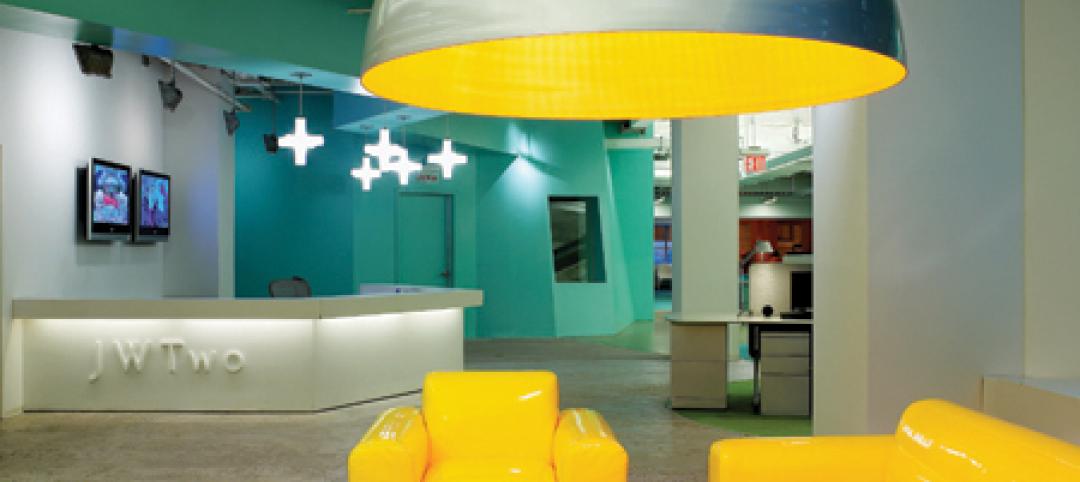U.S. Steel, which has operated in Pittsburgh for more than 100 years, plans to stay at least 18 more.
The giant steelmaker—which sold its 64-story U.S. Steel Tower headquarters in April 2011 and a year later announced it would move out of that building—has inked a deal with the Pittsburgh Penguins hockey franchise to build a five-story, 268,000-sf office building on the old Civic Arena site downtown, which the Penguins own.
A subsidiary of the Penguins and the team’s developer, St. Louis-based Clayco, will jointly own the new building, for which construction is scheduled to begin next summer and be completed by October 2017, around the time that U.S. Steel’s five-year lease on 450,000 sf in the U.S. Steel Tower expires. The projected cost of the new building was not disclosed.
U.S. Steel plans to move 800 employees from that tower and offices at Penn Liberty Plaza into 250,000 sf of the new building, which it will lease for at least 18 years, with an option to extend its lease beyond that. The rest of the space will be used for retail stores. The 2.25-acre site will include a museum highlighting Pittsburgh’s and U.S. Steel’s role in the worldwide steel industry.
The company’s decision to remain in Pittsburgh put an end to more than two years of speculation about where it might be headed. Indiana and Illinois reportedly were wooing U.S. Steel to relocate. U.S. Steel had also looked at several other buildings in different areas in and around Pittsburgh.

Site plan for U.S. Steel's new HQ, which will be located across from the Consol Energy Center, home of the Penguins NHL hockey team.
Several local news reports stated that it was Penguins’ CEO David Morehouse who convinced U.S. Steel’s CEO Mario Longhi to keep the company in Pittsburgh. The two chief executives met during a September 2013 barbecue at the home of the Penguins’ legendary player and co-owner Mario Lemieux. At that meeting, Morehouse impressed on Longhi that U.S. Steel was the “foundation upon which this city was built.”
Indeed, Pittsburgh’s Mayor Bill Perduto was on record saying “I didn’t want to be the Pittsburgh mayor to lose U.S. Steel.” Allegheny County Executive Rich Fitzgerald lobbied federal environmental, transportation, and trade officials on U.S. Steel’s behalf. And Pennsylvania Gov. Tom Corbett last month announced nearly $31 million in state grants to rehab three U.S. Steel plants in the state.
By agreeing to move into new digs, U.S. Steel would be the first corporate anchor tenant for a 28-acre Uptown site next to Consol Energy Center, where $440 million in development is planned, according to the Pittsburgh Tribune-Review and other news reports. That development would include retail, housing, and office space, and would be partially funded by more than $30 million in state grants and local tax-increment incentives, which would direct some of the development’s revenue to job training and other programs.
U.S. Steel has agreed to take only half of its potential abatements, with the rest of the incentives going to fund other parts of the Hill District, according to the Pittsburgh Post-Gazette.
Related Stories
| Aug 11, 2010
Florida mixed-use complex includes retail, residential
The $325 million Atlantic Plaza II lifestyle center will be built on 8.5 acres in Delray Beach, Fla. Designed by Vander Ploeg & Associates, Boca Raton, the complex will include six buildings ranging from three to five stories and have 182,000 sf of restaurant and retail space. An additional 106,000 sf of Class A office space and a residential component including 197 apartments, townhouses, ...
| Aug 11, 2010
Restoration gives new life to New Formalism icon
The $30 million upgrade, restoration, and expansion of the Mark Taper Forum in Los Angeles was completed by the team of Rios Clementi Hale Studios (architect), Harley Ellis Devereaux (executive architect/MEP), KPFF (structural engineer), and Taisei Construction (GC). Work on the Welton Becket-designed 1967 complex included an overhaul of the auditorium, lighting, and acoustics.
| Aug 11, 2010
Best AEC Firms to Work For
2006 FreemanWhite Hnedak Bobo Group McCarthy Building Companies, Inc. Shawmut Design and Construction Walter P Moore 2007 Anshen+Allen Arup Bovis Lend Lease Cannon Design Jones Lang LaSalle Perkins+Will SmithGroup SSOE, Inc. Timothy Haahs & Associates, Inc. 2008 Gilbane Building Co. HDR KJWW Engineering Consultants Lord, Aeck & Sargent Mark G.
| Aug 11, 2010
High-Performance Workplaces
Building Teams around the world are finding that the workplace is changing radically, leading owners and tenants to reinvent corporate office buildings to compete more effectively on a global scale. The good news is that this means more renovation and reconstruction work at a time when new construction has stalled to a dribble.
| Aug 11, 2010
Great Solutions: Business Management
22. Commercial Properties Repositioned for University USE Tocci Building Companies is finding success in repositioning commercial properties for university use, and it expects the trend to continue. The firm's Capital Cove project in Providence, R.I., for instance, was originally designed by Elkus Manfredi (with design continued by HDS Architects) to be a mixed-use complex with private, market-...
| Aug 11, 2010
Nurturing the Community
The best seat in the house at the new Seahawks Stadium in Seattle isn't on the 50-yard line. It's in the southeast corner, at the very top of the upper bowl. "From there you have a corner-to-corner view of the field and an inspiring grasp of the surrounding city," says Kelly Kerns, project leader with architect/engineer Ellerbe Becket, Kansas City, Mo.
| Aug 11, 2010
AIA Course: Historic Masonry — Restoration and Renovation
Historic restoration and preservation efforts are accelerating throughout the U.S., thanks in part to available tax credits, awards programs, and green building trends. While these projects entail many different building components and systems, façade restoration—as the public face of these older structures—is a key focus. Earn 1.0 AIA learning unit by taking this free course from Building Design+Construction.
| Aug 11, 2010
BIM adoption tops 80% among the nation's largest AEC firms, according to BD+C's Giants 300 survey
The nation's largest architecture, engineering, and construction companies are on the BIM bandwagon in a big way, according to Building Design+Construction's premier Top 50 BIM Adopters ranking, published as part of the 2009 Giants 300 survey. Of the 320 AEC firms that participated in Giants survey, 83% report having at least one BIM seat license in house, half have more than 30 seats, and near...
| Aug 11, 2010
World's tallest all-wood residential structure opens in London
At nine stories, the Stadthaus apartment complex in East London is the world’s tallest residential structure constructed entirely in timber and one of the tallest all-wood buildings on the planet. The tower’s structural system consists of cross-laminated timber (CLT) panels pieced together to form load-bearing walls and floors. Even the elevator and stair shafts are constructed of prefabricated CLT.
| Aug 11, 2010
Integrated Project Delivery builds a brave, new BIM world
Three-dimensional information, such as that provided by building information modeling, allows all members of the Building Team to visualize the many components of a project and how they work together. BIM and other 3D tools convey the idea and intent of the designer to the entire Building Team and lay the groundwork for integrated project delivery.








